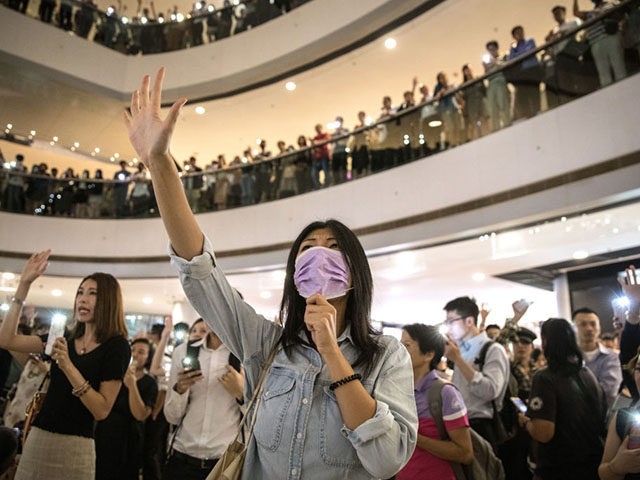Hundreds of people filled the inside of Cityplaza mall in Taikoo Shing, Hong Kong, on Sunday for a pro-democracy sing-along, the first major act of protest against the increasingly autocratic local government since the Chinese coronavirus limited public gatherings.
The event ended when riot police stormed the mall and attacked the participants, potentially exacerbating any spread of coronavirus that may have occurred if anyone in the crowd was contagious. Police stopped the protest before they could sing any songs, but some did sing the protest anthem “Glory to Hong Kong” while being forced out.
Monday marked the fourth time in eight days that Hong Kong did not document a single new Chinese coronavirus case. Some medical experts in the city are urging the government to remove restrictions on movement in the city given its notably small number of cases. At press time, Hong Kong has documented 1,037 cases of Chinese coronavirus and four deaths.
The Hong Kong Free Press (HKFP) reported that the protest, titled “Singing with You,” was scheduled to begin at the mall at 6 p.m. local time and attracted hundreds of people, appearing in videos to keep some distance from each other while in the open space of the center of the mall.
Many protested by chanting the now-familiar slogans of the 2019 Hong Kong protest movement, including “Liberate Hong Kong, Revolution of Our Times” and more specific demands like “Disband the Police Force.” Some of the protesters also waved Taiwanese flags, supporting the island nation’s independence and calling for a similar status for Hong Kong.
Others still called for the release of the over a dozen Hong Kong protest figures, most of them seniors, arrested last week for their role in encouraging democratic reform in China. Among the arrested were 81-year-old Democratic Party founder Martin Lee and 71-year-old owner of anti-communist newspaper Apple Daily Jimmy Lai, who was already out on bail for charges related to his support for the protest movement. Also arrested was Leung Kwok-hung, an ousted lawmaker stabbed in an attack the week before.
The raids last week were allegedly necessitated by the detainees engaging in “illegal assembly” in August.
Police stormed the mall on Sunday around 6:40 p.m., the HKFP reported, wearing riot gear and carrying pepper spray to attack the reportedly calm crowd. The publication noted government officials did not provide any particular reason for riot police, as opposed to a less aggressive police reaction proportional to the tenor of the crowd.
RTHK, a Hong Kong television and radio broadcaster, reported that police stopped and searched journalists covering the protests as well as threatening them with pepper spray canisters to force them to stop reporting on the incident. In Hong Kong, journalists at mass events often wear brightly colored vests to identify them as separate from participants in the event.
The rush of police into the mall caused panic, RTHK reported: “Stores pulled down their shutters after police burst in – some with customers still inside.”
Officials claimed the action was necessary as protesters were violating “social distancing” guidelines.
While mandating most common “social distancing” activities, Hong Kong’s courts recently upheld a ban on wearing masks at anti-China events.
The Taikoo Shing protest was actually the second such event during the weekend. On Friday, the South China Morning Post reported that about 100 people organized a protest event at a different mall, IFC Mall, similarly chanting protest slogans and urging the government to resist communist pressure from Beijing. The Post noted that the crowd attempted to organize “sparsely,” leaving space between them to respect Chinese coronavirus “social distancing” guidelines.
“Friday’s action was in support of prominent lawyers, activists and legislators arrested last week over anti-government unrest last year, and to rail against recent criticism of pan-democrat legislators by two central government bodies overseeing the city,” the Post noted. As a smaller protest, it did not attract the violent police response of Sunday’s event.
Pro-China lawmakers held a press conference on Monday to condemn the protests, claiming that lawmakers who supported human rights and democracy were guilty of “encouragement, tolerance and beautification” of violence, despite no evidence of any violence perpetrated by anyone but police officers this weekend.
“These are very serious crimes and this is extreme violence,” lawmaker Martin Liao reportedly said, referring to criminal charges against Hong Kong protest participants for alleged violent acts last year. “We are here to reprimand the pan-dem[ocracy] legislators for the encouragement and tolerance and the refusal to condemn violence in the past few months. That has, to some extent, contributed to this scenario.”
Hong Kong has reached a turning point on the Chinese coronavirus pandemic, some officials have suggested, given the lack of new cases in half of the past eight days. Hong Kong has documented 12 coronavirus cases in the past week.
“The last time Hong Kong had gone two consecutive days without a single confirmed infection was all the way back in January,” RTHK noted, though cases rose significantly after that dip. “No new Covid-19 cases were recorded on January 27 and 28, although there was a spike infections by the end of March.”
Even at the local epidemic’s peak, however, the largest number of daily cases Hong Kong reported was 65 people.
“I think schools can resume classes – either morning session or afternoon session but not the whole day of school,” Leung Chi-chiu, the chairman of Hong Kong’s Medical Association’s advisory committee on communicable diseases told RTHK. “We may consider partial resumption of our schools, step by step.”
With the need for “social distancing” eliminated, Hong Kong may soon see a resurgence of the protest movement that brought millions to the streets for half of 2019.
Follow Frances Martel on Facebook and Twitter.

COMMENTS
Please let us know if you're having issues with commenting.